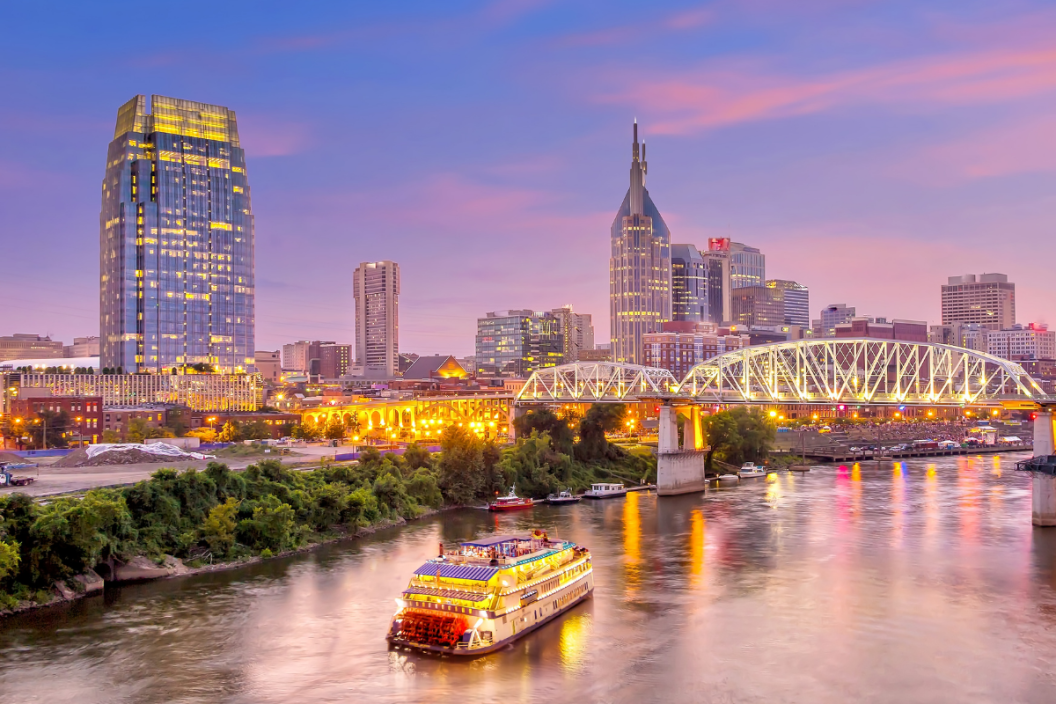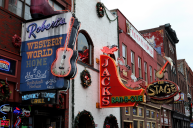Bordered by Kentucky to the north, North Carolina to the east, Virginia to the northeast, as well as Arkansas, Alabama, and Mississippi, the state of Tennessee is home to three big cities — Memphis, Knoxville, and the state capital of Nashville. (Sorry, Chattanooga.)
Featuring the Smoky Mountains, Graceland, Dollywood, Andrew Jackson's Hermitage, The University of Tennessee, the mighty Mississippi River, and deep roots from the Civil War, the state of Tennessee has a little bit of something for everyone.
But there's no end to reasons to visit Nashville, the coolest American city to visit right now outside of Atlanta or New York.
What is the Capital of Tennessee?
The capital city of Tennessee is Nashville, also known as the "Music City" or "Nash" for short. Located in the north-central part of the state, Nashville is home to Vanderbilt University, country music, and incredible neighborhoods full of charm and excitement. As the birthplace of the music business, the Country Music Hall of Fame, and the Grand Ole Opry House, there is no shortage of heart and soul in the city of Nashville.
What to Do in Nashville, Tennessee
Nashville is the largest city in Tennessee and spans 526 square miles, with the grand Cumberland River running through it. If you really want to dive into the history and culture of the music city, schedule a tour at the Tennessee State Capitol. The Capitol building is one of the oldest working capitols in the US. It is home to the Tennessee General Assembly, including the legislators, house of representative, and the senate.
1. Downtown Nashville
When you visit the Music City, you must stroll down Nashville's Honky Tonk Highway, where live music is rockin', and art galleries, hot chicken eateries, and boutique hotels are a dime a dozen.
No matter what time of year you visit, you are guaranteed to see some live music and have a great time. Some highlights include the Ryman Auditorium, Gray Line Tennessee, the Tennessee Performing Arts Center, and the Tennessee Sports Hall of Fame.
2. Bicentennial Capitol Mall State Park
You know we love a State Park in the middle of a city, which is why Bicentennial Capitol Mall State Park is on this list. Besides its prominent role in preserving the city's history, Bicentennial Capitol Mall is a testament to Tennessee's Bicentennial Celebration (June 1, 1996).
This 11-acre park is ideal for a walking tour in nature to gather information about the state, see the World War II Memorial, and witness the Walkway of Counties, where you can see native plant species from different regions of the state.
3. Tennessee State Museum
https://www.instagram.com/p/CGake—H3dU/?utm_source=ig_web_copy_link
A great tour to couple with a visit to Bicentennial Capitol Mall, the Tennessee State Museum showcases the prolific history of the U.S.state of Tennessee. Permanent exhibits include "Forging a Nation," the "Tennessee Time Tunnel," "Tennessee Transforms," "Natural History," "Change & Challenge," "The Civil War and Reconstruction," and "First Peoples."
Check the website to find out about seasonal exhibits and other events happening at the museum.
4. Centennial Park & The Parthenon
Nestled near Vanderbilt University two miles west of Downtown, Centennial Park is one of the city's esteemed pieces of real estate with 132 acres to explore.
Featuring the Parthenon, a mile-long walking trail, Lake Watauga, the art center, a sunken garden, events space, sand volleyball, a dog park, and a bandshell, Centennial Park is a fantastic place for both visitors and Tennesseans to spend a sunny day in the music city.
5. Country Music Hall of Fame
RELATED: West Virginia's Beauty is on Full Display at Blackwater Falls
Aimed to preserve, research, and uphold American vernacular music since the sixties, The Country Music Hall of Fame® and Museum keeps the tradition alive through publications, programs, and exhibits. A staple of Nashville history and its musical identity, the Museum and Hall of fame presents over 2.5 million artifacts, including priceless photographs, stage costumes, instruments, and other relics of audible fascination.
6. Neighborhoods of Nash
One of the most fun activities when staying in Nash is visiting all of the vibrant and unique communities established in the city. Nashville neighborhoods each offer a unique feel and a story to be told with a distinctive feel and vibe. From Downtown to Opryland/Music Valley to The Gulch to Belmont/Hillsboro to 12South to Berryhill...pick a few neighborhoods and get to eating, shopping, and discovering!
7. Grand Ole Opry
The Grand Ole Opry could easily be called the home of country music as its remarkable stage has seen the past, present, and future of the genre since the new stage was opened in 1974. A platform used to connect fans and musicians to the music they adore, the Opry should be a must on your Nashville bucket list.
8. Greenways for Nashville
A fantastic way to navigate the city by foot or bike, the Greenway system provides almost 100 miles of paths that span from short walks to 10-mile bike rides. Located all across Davidson County, you can check out the interactive map and plan your outdoor adventure in the Music City!
A Brief History of Music City
The deep Civil War history of the state includes historical sites such as Murfreesboro, Clarksville, Franklin, Kingston, and other small towns in the "Volunteer State." Initially, the land that is now Tennessee is home to the Cherokee, Chickasaw, Shawanwaki/Shawnee, and S'atsoyaha (Yuchi) Native American tribes, who were forcibly removed to the Indian Territory (modern-day Oklahoma) in the 1830s.
In 1843, Nashville was named the permanent capital city of Tennessee as the region was quickly gaining notoriety as the music center of the nation and a booming hub in middle Tennessee.
Ever visited Nashville? Share your travel memories at our Wide Open Roads Facebook!




